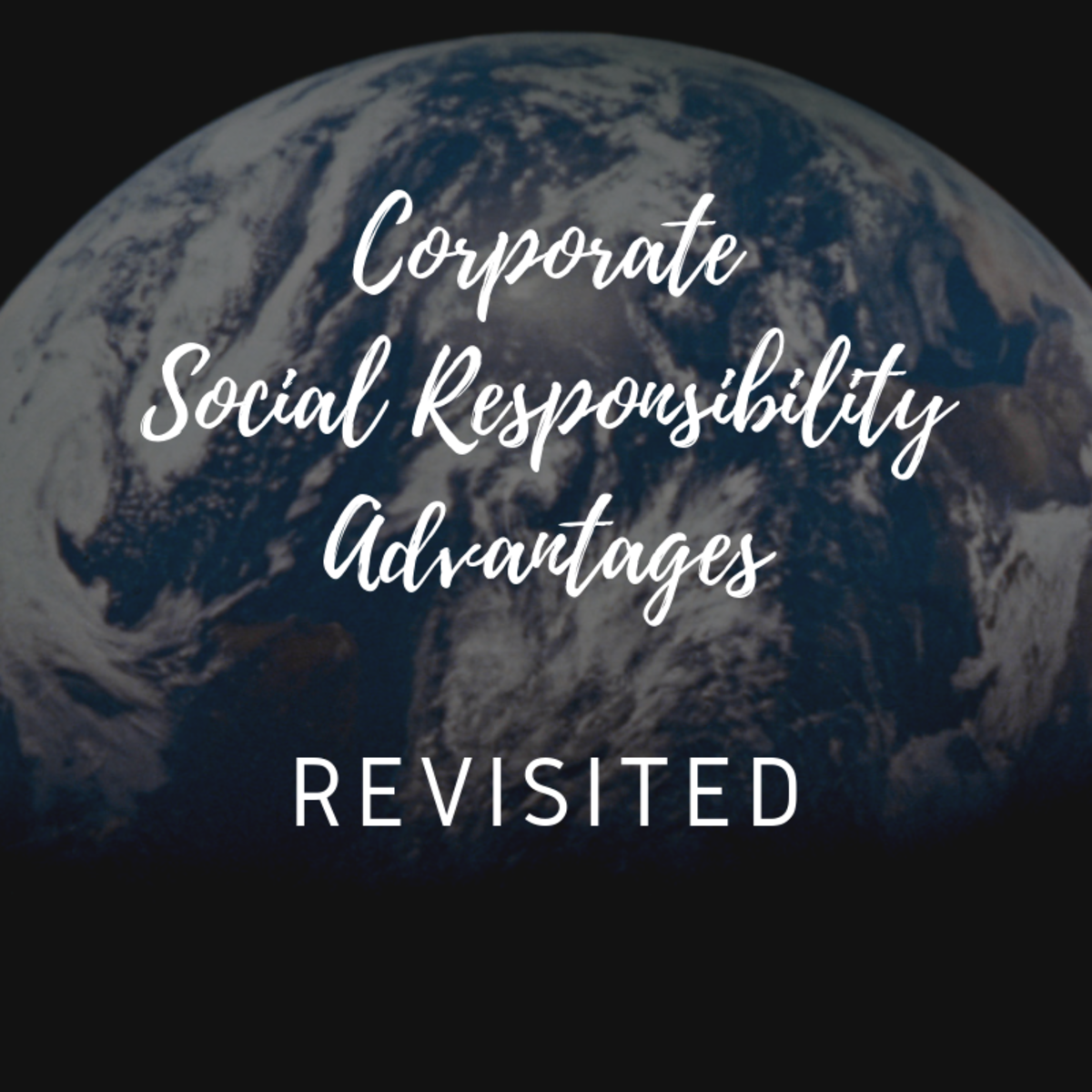The Growing Importance of CSR (Corporate Social Responsibility)
Corporate Social responsibility (CSR) is the responsibility recognized by the companies for acting in socially responsible manner. There is no single universally accepted definition of corporate social responsibility, it has generally come to mean business decision making linked to ethical values, legal compliance, and respect for people, community, and environment. CSR accepts a company to go further than required by law so as to
- treat employees fairly and with respect
- operate with integrity and in an ethical manner in all its business dealings with customer, suppliers, lenders, and others
- respect human rights
- sustain the environment for future generations
- be a responsible neighbor in the community and a good ‘corporate citizen’.
Occupational welfare and corporate community welfare or corporate social responsibility (CSR) are of growing importance to governments and service providers as they promise to meet challenges of social problems within changing welfare environments. The modern governments have increasingly resorted to corporate involvement in local services and have also encouraged the expansion of occupational welfare. Despite its growing importance CSR remains an under-researched area even as business organizations have faced new demands for increasing levels of occupational provision and involvement in local partnerships with public services.
Over the last twenty years, an increasingly large number of business houses have responded positively to the banner of CSR. This has perhaps been partly due to their aspiration to make their operations more ethical. While for the government, the role the businesses can play in the development of society is quite crucial, the activist community might like to take credit for the growing importance of CSR as a clear victory for their efforts in pressurizing the activities of companies. To put the same in other words, companies introduced CSR reports and programs as a response against damage inflicted on their sale and reputation by attacks from activist groups who aided by 24-hour news media in which corporate wrongdoing has been especially highlighted. While on the one hand, this makes a compelling news, it puts an ethical pressure on the companies to give back at least a part to society in return what they have gained from it. It is, therefore, no longer important for companies to just make the profit, the way this profit is generated is deeply investigated by the activists. A company must not be seen violating ethics or law in any of the areas like market behavior, trade policies, employment relations, sourcing of raw materials, human rights, environmental laws or the activists would put pressure on them through media or the other channels. This analysis, however, fails to appreciate much of the social contributions businesses have been making since long back. We have the example of Joseph Rowntree and others and the way they developed their workforces. In the 1980s, a network of companies came together to establish Business in the Community (BITC). Later, they launched Per Cent Club whose members donate 1 percent of pre-tax profits to the community. BITC is a very widely acknowledged and influential force within the business and in CSR arena.
A set of indicators for the companies wanting to measure and report CSR has been developed by the BITC. The Indicators that Count addresses four impact areas: workplace, marketplace, environment, and community. The indicators have been classed into two groups. The core indicators consist of 27 basic indicators on which all the companies are expected to report. The six advanced indicators are judged more difficult to measure. The other group, made up of 17 specific indicators, may not be relevant to all companies.
There are also specific projects for the measurement and reporting of particular aspects of responsible business, as for example, Human Capital and Disability. Human capital management and disability will have growing importance in CSR reporting. In the UK, Accounting For People Taskforce has proposed a reporting framework for human capital management (HCM). This task force, appointed by the UK government was represented by Denise Kingsmill as chairman and a number of other business leaders. According to the Taskforce report, even as people typically account for up to 65 percent of a company’s costs, there has been, however, little reporting on how companies develop their people.
The companies may either include CSR report in their annual report and accounts or may publish their separate corporate responsibility report which may be called a ‘social and environmental report’ or a ‘sustainability report’. These reports indicate a company’s commitment toward ethical behavior and highlight their progress towards achieving their strategic CSR objectives.
Increasingly more and more companies have begun to incorporate ethics and CSR in their strategic planning and objectives. Many large companies have adopted formal environmental policies with the objectives of creating a sustainable business and being environment friendly. For instance, a company that uses large quantities of timber as the raw material might adopt a policy of re-forestation to replace the trees they have cut down.
The growing importance of CSR in context of market and public policies raises a key issue, that of the legal recognition of CSR benchmarks (labels, certifications, ratings etc.) and their progressive convergence across the market, that is, a broad consensus on scope and contents of CSR benchmarks. Since November 2003, several initiatives have taken place towards CSR convergence on benchmarks, including the EU CSR forum aimed at facilitating the exchange of experience and good practices in order to establish common guidelines for CSR tools.
It needs no argument to claim that CSR practices adopted by the companies pay them off in managing their image. Since the beginning of the 1990s, companies are changing their business practices under ethical framework. Consider these examples: Nike and the other similar footwear and apparel companies are monitoring working condition in their supplier factories in developing nations; Ikea requires its rug suppliers in India to prohibit the employment of children and provide their families with financial assistance to keep children out of labor market; Starbucks and the other major coffee distributors and retailers sell coffee bearing their ‘Fair Trade’ label; Home Depot and the other major retailers of wood products no longer sell products harvested from old growth or endangered forests; British Petroleum and several other major firms in the United States and Europe have significantly reduced its green house gas emission; Shell and the other major extractive firms have adopted policies to address human rights and environmental abuses associated with its investments in developing countries; Timberland allows its employees to take one week off with pay each year to work with local charities; PepsiCo along with more than a dozen oil companies and consumer goods manufacturers have withdrawn investments from Burma because of human rights concerns; Citibank along with other major financial institutions has developed criteria for assessing the environmental impact of its lending decisions in developing countries. While these are few cases of CSR, there are many more examples that cannot be included here for lack of space.
CSR is becoming an increasingly important component in public affairs program. That’s because of a number of reasons but the primary one is because of a need to maintain a good reputation and trust among the stakeholders. The government and the political entities will not want to maintain a relationship with or deal with organizations that do not treat their stakeholders, especially employees well. The perceptions of poor CSR may have their attendant consequences for those organizations that
- do not follow the ‘best practices’ of their competitors or others in their sector. If others behave better than you then your public affairs activity may suffer;
- have a poor standing in the community;
- have been the target of activist groups
- are being targeted by the media on a regular basis because of their behavior.
It is to be remembered that media provides much of the information to political audiences and regulators. The other sources of information apart from media on the activities of organizations include
- friends and families
- other politicians/regulators
- the views of the electorate/their constituency in the case of MPs;
- the behavior of similar organizations (comparisons);
- activist organizations.
In the days to come CSR will go on to gain further importance for a number of reasons including the competitive advantage to be garnered by the companies. Even now, companies in Europe and North America are waking up to the strategic possibilities and competitive advantages offered by being an environment friendly company. Customers might be willing to pay more for environment friendliness and for healthy food. Environment-friendly and cheaper automobiles, for instance, have attracted public attention. In other words, CSR activities can create value addition. Michael Porter has suggested embedding CSR into corporate and business strategy to create competitive advantage.
Corporate Social Responsibility is the latest buzz word to which increasingly more and more companies are getting attentive. Moreover, the governments are keen that companies take to CSR route as social welfare is becoming both public and private sector responsibility. The companies too are realizing the hidden costs of failing to meet this crucial social responsibility that is more ethically and morally binding than legal necessity. It entails going beyond just the legal responsibilities. There are, however, issues of labeling and standardization associated with CSR. Nonetheless, it is expected that a level playing field will emerge as the number of stakeholders will also go on increasing. Corporate Social Responsibility must be seen by the companies as a responsibility not imposed by outside forces but guided by conscience and the best practices of giving back to society, people, communities, and environment what they took from them. What is even more important, companies have begun to realize the criticality of CSR as value addition that might offer them a competitive advantage in business.
Advertising Space - After your Hub is published advertisements may be placed in this space.
Advertising Space - After your Hub is published advertisements may be placed in this space.
RELATED
What is Corporate Sustainability or Corporate Social Responsibility (CSR)?
BUSINESS & SOCIETY
What is Corporate Sustainability or Corporate Social Responsibility (CSR)?
by Anna4
Social Responsibility of Management and Responsibilities of Managers
ECONOMIC DEVELOPMENT & GROWTH
Social Responsibility of Management and Responsibilities of Managers
by jacobkuttyta68
The Limits and Problems of ISO 26000
BUSINESS ETHICS & PROFESSIONALISM
The Limits and Problems of ISO 26000
by Tamara Wilhite0
Christian Social Responsibility
CHRISTIAN LIVING
Christian Social Responsibility
by Ricksen Surya Winardhi1
POPULAR
Is it important to you to listen to the opinion of others, even when you disagree?
SOCIAL ISSUES
Is it important to you to listen to the opinion of others, even when you disagree?
by Patricia Scott59
Advertising Space - After your Hub is published advertisements may be placed in this space.
COMMENTS
A_K profile imageAjit Kumar Jha
Add Your Comment...
Post Comment
profile image
Hetty
2 years ago
I think you hit a bulyesle there fellas!
Not spamDelete forever
Status: Spam.
ip: 62.119.183.35
profile image
salimaa
5 years ago
useful article, thank you.
Deny
Status: Approved.
ip: 78.151.54.24
profile image
Nana Yaw Ampadu
6 years ago
How does CSR affect the corporate image of an organisations? Any suggestions or materials please?
Deny
Status: Approved.
ip: 41.66.252.158
jamiesweeney profile image
jamiesweeney
6 years ago from Philadelphia, PA
Excellent article.
Deny
Status: Approved.
ip: 112.198.241.38
A_K profile imageAuthor
Ajit Kumar Jha
7 years ago from Delhi
Thank you fibo777 for your observation. As I said, CSR is not guided by external pressure but by internal conscience that I believe is an issue of social evolution...that I am optimistic about eventually.
Moderate my own commentStatus: Visible.
ip: 116.74.41.42
fibo777 profile image
fibo777
7 years ago from UK
I guess banks and some large corporations that got bailouts from US and European governments haven't got the slightest idea what CSR is. And they should be first in the row. Thanks for the article.
Deny
Status: Approved.
ip: 78.60.137.137
A_K profile imageAuthor
Ajit Kumar Jha
7 years ago from Delhi
You're right American Romance for the most part. Yet, you would find some exemplary companies and visionary promoters that have taken true steps in the direction of corporate social responsibility, most others use this term in their annual reports any way. However, would you deny that businesses and community and the larger society as well are integrated with the mutual responsibility of give and take. Yet I appreciate that you are frank enough to call a spade a shovel.
Moderate my own commentStatus: Visible.
ip: 116.74.41.42
American Romance profile image
American Romance
7 years ago from America
So you believe that a company or corporation has a social responsibility? I believe what your saying relates to wealth distribution, regulation and businessess becoming or associating with parts of the community that have nothing to do with their goal of building products and making a profit for themselves and their stock holders. I do not buy into this crap! I believe what you are saying is a large part of why there are few jobs in this country right now! Because every liberal out there thinks that someone else owes them something!
Deny
Status: Approved.
ip: 166.164.157.39
al responsibility (CSR) is the responsibility recognized by the companies for acting in socially responsible manner. There is no single universally accepted definition of corporate social responsibility, it has generally come to mean business decision making linked to ethical values, legal compliance, and respect for people, community, and environment. CSR accepts a company to go further than required by law so as to
- treat employees fairly and with respect
- operate with integrity and in an ethical manner in all its business dealings with customer, suppliers, lenders, and others
- respect human rights
- sustain the environment for future generations
- be a responsible neighbor in the community and a good ‘corporate citizen’.
Occupational welfare and corporate community welfare or corporate social responsibility (CSR) are of growing importance to governments and service providers as they promise to meet challenges of social problems within changing welfare environments. The modern governments have increasingly resorted to corporate involvement in local services and have also encouraged the expansion of occupational welfare. Despite its growing importance CSR remains an under researched area even as business organizations have faced new demands for increasing levels of occupational provision and involvement in local partnerships with public services.
Over the last twenty years an increasingly large number of business houses have responded positively to the banner of CSR. This has perhaps been partly due to their aspiration to make their operations more ethical. While for the government, the role the businesses can play in the development of society is quite crucial, the activist community might like to take credit for the growing importance of CSR as a clear victory for their efforts in pressurizing the activities of companies. To put the same in other words, companies introduced CSR reports and programs as a response against damage inflicted on their sale and reputation by attacks from activist groups who aided by 24 hour news media in which corporate wrongdoing has been especially highlighted. While on the one hand this makes a compelling news, it puts an ethical pressure on the companies to give back at least a part to society in return what they have gained from it. It is therefore, no longer important for companies to just make profit, the way this profit is generated is deeply investigated by the activists. A company must not be seen violating ethics or law in any of the areas like market behavior, trade policies, employment relations, sourcing of raw materials, human rights, environmental laws or the activists would put pressure on them through media or the other channels. This analysis however fails to appreciate much of the social contributions businesses have been making since long back. We have the example of Joseph Rowntree and others and the way they developed their workforces. In 1980s, a network of companies came together to establish Business in the Community (BITC). Later, they launched Per Cent Club whose members donate 1 percent of pre-tax profits to the community. BITC is a very widely acknowledged and influential force within business and in CSR arena.
A set of indicators for the companies wanting to measure and report CSR has been developed by the BITC. The Indicators that Count addresses four impact areas: workplace, market place, environment and community. The indicators have been classed into two groups. The core indicators consist of 27 basic indicators on which all the companies are expected to report. The six advanced indicators are judged more difficult to measure. The other group, made up of 17 specific indicators, may not be relevant to all companies.
There are also specific projects for the measurement and reporting of particular aspects of responsible business, as for example, Human Capital and Disability. Human capital management and disability will have growing importance in CSR reporting. In the UK, Accounting For People Taskforce has proposed a reporting framework for human capital management (HCM). This taskforce, appointed by the UK government was represented by Denise Kingsmill as chairman, and a number of other business leaders. According to the Taskforce report, even as people typically account for up to 65 percent of a company’s costs, there has been, however, little reporting on how companies develop their people.
The companies may either include CSR report in their annual report and accounts or may publish their separate corporate responsibility report which may be called a ‘social and environmental report’ or a ‘sustainability report’. These reports indicate a company’s commitment toward ethical behaviour and highlight their progress towards achieving their strategic CSR objectives.
Increasingly more and more companies have begun to incorporate ethics and CSR in their strategic planning and objectives. Many large companies have adopted formal environmental policies with the objectives of creating a sustainable business and being environment friendly. For instance, a company that uses large quantities of timber as raw material might adopt a policy of re-forestation to replace the trees they have cut down.
The growing importance of CSR in context of market and public policies raises a key issue, that of the legal recognition of CSR benchmarks (labels, certifications, ratings etc.) and their progressive convergence across the market, that is, a broad consensus on scope and contents of CSR benchmarks. Since November 2003, several initiatives have taken place towards CSR convergence on benchmarks, including the EU CSR forum aimed at facilitating the exchange of experience and good practices in order to establish common guidelines for CSR tools.
It needs no argument to claim that CSR practices adopted by the companies pay them off in managing their image. Since the beginning of the 1990s, companies are changing their business practices under ethical frame work. Consider these examples: Nike and the other similar footwear and apparel companies are monitoring working condition in their supplier factories in developing nations; Ikea requires its rug suppliers in India to prohibit the employment of children and provide their families with financial assistance to keep children out of labor market; Starbucks and the other major coffee distributors and retailers sell coffee bearing their ‘Fair Trade’ label; Home Depot and the other major retailers of wood products no longer sells products harvested from old growth or endangered forests; British Petroleum and several other major firms in United States and Europe have significantly reduced its green house gas emission; Shell and the other major extractive firms have adopted policies to address human rights and environmental abuses associated with its investments in developing countries; Timberland allows its employees to take one week off with pay each year to work with local charities; PepsiCo along with more than a dozen oil companies and consumer goods manufacturers have withdrawn investments from Burma because of human rights concerns; Citibank along with other major financial institutions has developed criteria for assessing the environmental impact of its lending decisions in developing countries. While these are few cases of CSR, there are many more examples that cannot be included here for lack of space.
CSR is becoming an increasingly important component in public affairs program. That’s because of a number of reasons but the primary one is because of a need to maintain a good reputation and trust among the stakeholders. The government and the political entities will not want to maintain a relationship with or deal with organizations that do not treat their stakeholders, especially employees well. The perceptions of poor CSR may have their attendant consequences for those organizations that
- do not follow the ‘best practices’ of their competitors or others in their sector. If others behave better than you then your public affairs activity may suffer;
- have a poor standing in the community;
- have been the target of activist groups
- are being targeted by the media on a regular basis because of their behavior.
It is to be remembered that media provides much of the information to political audiences and regulators. The other sources of information apart from media on the activities of organizations include
- friends and families
- other politicians/regulators
- the views of the electorate/their constituency in the case of MPs;
- the behavior of similar organizations (comparisons);
- activist organizations.
In the days to come CSR will go on to gain further importance for a number of reasons including the competitive advantage to be garnered by the companies. Even now, companies in Europe and North America are waking up to the strategic possibilities and competitive advantages offered by being an environment friendly company. Customers might be willing to pay more for environment friendliness and for healthy food. Environment friendly and cheaper automobiles, for instance, have attracted public attention. In other words, CSR activities can create value addition. Michael Porter has suggested embedding CSR into corporate and business strategy to create competitive advantage.
Corporate Social Responsibility is the latest buzz word to which increasingly more and more companies are getting attentive. Moreover, the governments are keen that companies take to CSR route as social welfare is becoming both public and private sector responsibility. The companies too are realizing the hidden costs of failing to meet this crucial social responsibility that is more ethically and morally binding than legal necessity. It entails going beyond just the legal responsibilities. There are, however, issues of labeling and standardization associated with CSR. Nonetheless, it is expected that a level playing field will emerge as the number of stakeholders will also go on increasing. Corporate Social Responsibility must be seen by the companies as a responsibility not imposed by outside forces but guided by conscience and the best practices of giving back to society, people, communities, and environment what they took from them. What is even more important, companies have begun to realize the criticality of CSR as value addition that might offer them competitive advantage in business.







